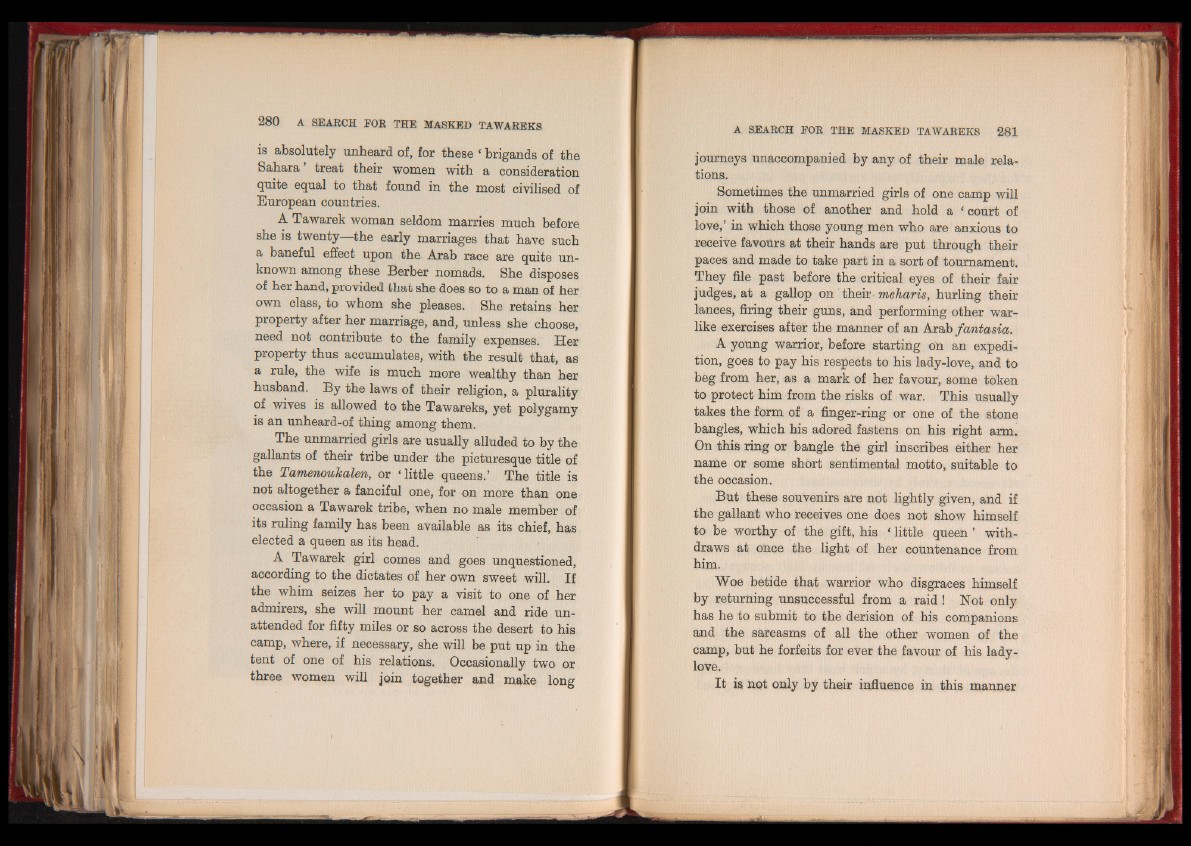
is absolutely unheard of, for these ‘ brigands of the
Sahara treat their women with a consideration
quite equal to that found in the most civilised of
European countries.
A Tawarek woman seldom marries much before,
she is twenty—the early marriages that have such
a baneful effect upon the Arab race are quite unknown
among these Berber nomads. She disposes
of her hand, provided that she does so to a man of her
own class, to whom she pleases. She retains her
property after her marriage, and, unless she choose,
need not contribute to the family expenses. Her
property thus accumulates, with the result that, as
a rule, the wife is much more wealthy than her
husband. By the laws of their religion, a plurality
of wives is allowed to the Tawareks, yet polygamy
is an unheard-of thing among them.
The unmarried girls are usually alluded to by the
gallants of their tribe under the picturesque title of
the TamenouJcalen, or ‘little queens.’ The title is
not altogether a fanciful one, for on more than one
occasion a Tawarek tribe, when no male member of
its ruling family has been available as its chief, has
elected a queen as its head.
A Tawarek girl comes and goes unquestioned,
according to the dictates of her own sweet will. If
the whim seizes her to pay a visit to one of her
admirers, she will mount her camel and ride unattended
for fifty miles or so across the desert to his
camp, where, if necessary, she will be put up in the
tent of one of his relations. Occasionally two or
three women will join together and make long
journeys unaccompanied by any of their male relations.
Sometimes the unmarried girls of one camp will
join with those of another and hold a ‘ court of
love,’ in which those young men who are anxious to
receive favours at their hands are put through their
paces and made to take part in a sort of tournament.
They file past before the critical eyes of their fair
judges, at a gallop on their meharis, hurling their
lances, firing their guns, and performing other warlike
exercises after the manner of an Arab fantasia.
A young warrior, before starting on an expedition,
goes to pay his respects to his lady-love, and to
beg from her, as a mark of her favour, some token
to protect him from the risks of war. This usually
takes the form of a finger-ring or one of the stone
bangles, which his adored fastens on his right arm.
On this ring or bangle the girl inscribes either her
name or some short sentimental motto, suitable to
the occasion.
But these souvenirs are not lightly given, and if
the gallant who receives one does not show himself
to be worthy of the gift, his ‘ little queen ’ withdraws
at once the light of her countenance from
him.W
oe betide that warrior who disgraces himself
by returning unsuccessful from a raid! Not only
has he to submit to the derision of his companions
and the sarcasms of all the other women of the
camp, but he forfeits for ever the favour of his ladylove.
It is not only by their influence in this manner